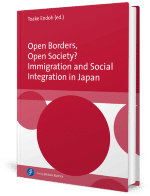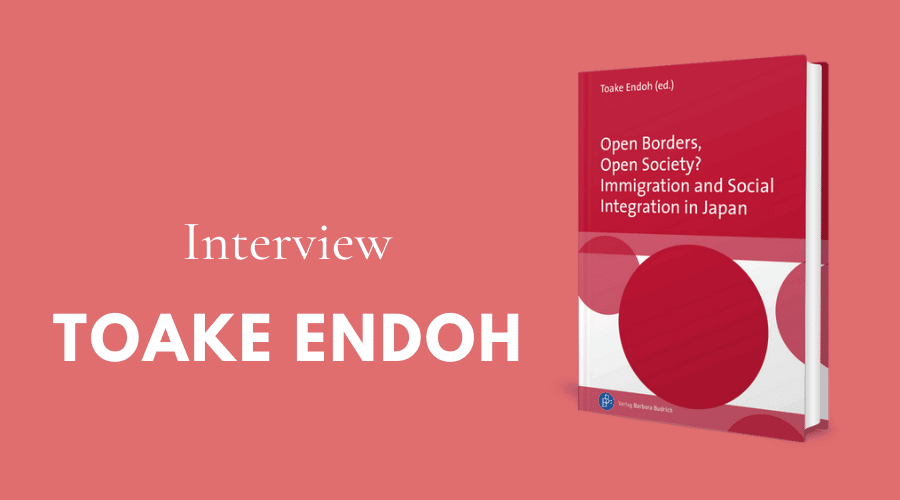
New with Budrich:
Open Borders, Open Society? Immigration and Social Integration in Japan
edited by Toake Endoh
About the book
Is Japan prepared for an ethnically-diverse society? The volume examines the past and future trajectory of Japan’s immigration and integration policies and related institutions, taking a cross-disciplinary approach in social sciences. The authors highlight critical issues and challenges that the nation is facing as a result of the government’s inarticulate migrant-acceptance policy, e.g. in the fields of deportation, refugee policy, multicultural education and disaster protection. How can the situation be improved? The book investigates the changes and initiatives needed to build a resilient policy regime for a liberal, pluralistic, and inclusive Japan.
Dear Toake Endoh, in your book you bring together different perspectives on the past and future trajectory of Japan’s immigration and integration policies. What kind of contributions does the anthology contain?
As Japan advances its policy of „foreign worker acceptance“ (I call it “immigration”), it is increasingly facing a gamut of problems related to the integration of migrants. Some of these issues are also found in other migrant-receiving countries, while others are specific to Japan.
This volume addresses issues that have been relatively under-researched but are crucial for contemporary Japan, such as migrants and disaster preparedness, Japanese language teaching as a national policy, and exclusion and deportation of migrants, including asylum seekers. Our multi-dimensional and cross-disciplinary approach reveals a growing gap between the inarticulate and restrictive national policy and the „multi-ethnic reality”. Apparently, the Government of Japan is keen to delegate affairs related to the integration of migrants to local authorities, welfare organisations and the migrants themselves. Which is in tune with the neo-liberal dogma of „first, self-help, then mutual help, and lastly (or never) public help“. A laissez-faire approach that is unsustainable.
With this book, I also want to emphasize that migrants are not monolithic or a powerless and disposable labour force (see, for instance, the diversity of ”Vietnamese people“) but a critical, potential (thus unpredictable), and indispensable human wealth. They can be the saviours of the depopulated nation and the stagnant economy.
Especially, the policy areas of disaster preparation and inbound tourism can greatly benefit from their active participation as a critical stakeholder. I believe that this volume sufficiently proves this.
Japan, a long-time immigration laggard, is opening its gate to foreign workers, both skilled and less skilled, to address its chronic labour shortage through legal and policy changes. How does Japanese society perceive the changes in its environment and workplace?
I must say that Japan is a laggard in data/evidence-driven policymaking regarding migration. The way the government decides to import a certain number of foreign workers for a certain period of time is not based on solid labour shortage data. Meanwhile, the government is highly keen to how the public feels about immigration or migrants, even though immigration rarely becomes an electoral issue, unlike in Europe or in the US.
Japanese perceptions of immigration or people of foreign origin are becoming more diverse. Some Japanese remain conservative (i.e., “no immigration, please”), exclusionary, and even xenophobic. These opponents of immigration are likely to have limited or no practical experience with foreigners and are influenced by negative stories they hear about migrants or refugees.
Immigration advocates are to be found in the ranks of large companies (represented by the Keidanren) or labour-thirsty small-/medium-sized concerns. Their motive is economy.
But nowadays, immigration in Japan has new supporters: the Millennials and Generation Z. In general, these generations are more open-minded, curious about (and unafraid of) different cultures, feeling at ease to interact with foreigners, and liberal-minded, having a keen sense of justice and equality. High school or college students are part of this group that advocates for immigrants. At public rallies and forums, there are many young faces protesting the mistreatment of foreign detainees by immigration authorities. They also demand justice against companies that exploit and abuse migrant workers, or against racially motivated hate groups. Japan’s warm welcome of Ukrainian refugees (though the government carefully avoids the category “refugee”) points to another sign of change. Meanwhile, Japan has accepted more than 1,400 Ukrainians and provided them with temporary protection, shelter, and work permits. Japan’s willkommen attitude toward these strangers from a remote continent is unprecedented indeed. It is extraordinary, given that the country has been extremely stringent in refugee recognition (with the acceptance rate of 0.7 percent). Cynics may downplay the nation-wide compassion as a political show case or a racially motivated feel-good act. But such thinking is premature. This extraordinary collective experience can be a national awakening to how easily peace can be disturbed and destroyed, which can inspire a more serious and compassionate approach to refugees and migration worldwide, and to make an important contribution to a liberal world.
Which findings of your research can be transferred to the situation of other countries – which could help us here in Europe to deal with migration?
It is interesting to note that even after the burst of the economic bubble – a bubble created by neoliberal policies – in the early 1990s, Japan continued and deepened the same policy mix of privatisation and deregulation. Predictably, it has failed to resuscitate its shrinking and weakening economy. And the unprecedented scale of monetary loosening by the central bank did not work either. Having experienced the ”Lost Thirty Years”, the Japanese people have finally realized that the main cause of their socio-economic malaise is their mono-ethnic society, which is, among other things, hostile to immigrants. And this situation is driving Japan to gradually open up its society to foreign workers. Given the soul-searching that Japan is currently painfully undergoing, it would be ironic and unfortunate if European countries were to close their borders and reject greater regional integration and globalization.
Who are you addressing with your book?
It is said that Russia’s war against Ukraine could halt or even reverse globalization currents and accelerate the division or segmentation of the world. If wealth disparities and conflicts persist, the problems associated with cross-border migration and refugees might not be solved. They continue to be “our“ problems. With this in mind, I recommend this anthology not only to researchers studying migration and refugees, but also to all readers interested in world affairs.
Short vita of Toake Endoh
Toake Endoh is professor of political science and currently Dean of Graduate School of International Administration at Josai International University (Japan). She received her MA from the University of Texas at Austin (Latin American studies), Master of Philosophy and PhD from Columbia University (political science). In the US, she has taught at the State University of New York, the City University of New York, and Hawaii Tokai International College. Her area of research and publication include Japan’s emigration policy toward Latin America, protection of migrants from disasters, and Japan’s immigration and deportation policies. Her most recent research is a comparative study of historical institutional developments of deportation regimes in Japan and the UK.

New with Budrich:
Open Borders, Open Society? Immigration and Social Integration in Japan
edited by Toake Endoh

